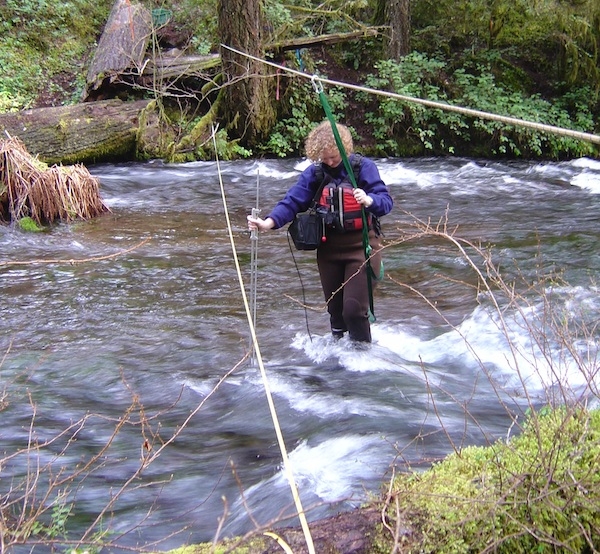This summer, I’m involved with a super-cool Research Experiences for Undergraduates (REU) program focused on aquatic-terrestrial linkages in urban impacted ecosystems. Undergraduate students come to Kent State for 10 weeks to design, undertake, and present a mentored, independent research project, which is a huge boost for graduate school applications or just figuring out whether scientific research is the right path for you. In the first few weeks, our REU students also take field trips to various natural and urban green areas in the region. I got to help with a trip to Cleveland Metroparks Watershed Stewardship Center and some surrounding neighborhoods, where Metroparks has been undertaking efforts to distribute storm water management through rain gardens, rain barrels, and bioretention cells. A MS student working with me is focused on the hydrologic impacts of these efforts, and the REU student I’m mentoring will be adding to our knowledge about how soil moisture and plant conditions affect bioretention performance. Here I am telling the group about how bioretention cells are built and what we know about how well they are working:
Learning about storm water management with @highlyanne who is outstanding in her field, so to speak #KSUHoldenREU pic.twitter.com/6jMAkXu7zm
— Pat Lorch (@PatyMyBoy) June 12, 2014
I was tickled when I saw this photo and its accompanying tweet, not only because of the nice pun, but also to think that a bioretention cell is now “the field” for me and my students. It doesn’t seem so long ago when this was me in the field:
My PhD research focused on the hydrology of massively spring-fed streams in the Oregon High Cascades, how they are a function of the young volcanic landscape in which they are found, and how the springs, their streams, and the landscape co-evolve over geologic time.
I think these two photos nicely capture some fundamental features of scientific careers.
First, your whole career won’t be defined by topic of your PhD. Your interests, and the opportunities that are available, will evolve over time as you move geographically and professionally and as the field changes along with you. I dimly recall my undergraduate professors telling me something like this, but I didn’t really understand it until much later. I’ve written before how the move from Oregon (volcanoes, big springs, and snow) to North Carolina (none of the preceding, but lots of interesting urban streams) altered my perspectives. I still work a little on topics related to my PhD, but its clear that my professional trajectory has moved in a different direction. Some movement is also necessary if you want to establish yourself as a scientist independent of your former advisors, and that’s often a tenure requirement. A lot of people don’t shift course as radically as I have, but few researchers will go their whole careers with a single narrow focus.
Second, the field won’t always be your focus. At some point you stop being the student and become the teacher. In that transition, you’ll probably stop doing the frequent and hard physical work in the field and instead make only occasional forays to field sites, during which you are liable to be caught pontificating. This is a bit bittersweet for me. I love mentoring students and helping them to develop into scientists and professionals in their own right, and my job and life are now multi-faceted enough that frequent or extended field work would be hard to manage. But I miss getting to spend long summer days in the field, measuring streamflow or soils, writing data in a rite-in-the-rain notebook, and being the very first person to ever know some infitesimally small piece of knowledge. I miss the intimate connection with my field areas, watching them change subtly with passing storms and seasons. Fortunately, I’ve been haunting the isotope lab lately, getting to intimately know the quirks of the isotope analyzer, and being the first person to look at the data coming off each run. It’s not the same as the field, but it gives me some of the same thrill of discovery.
On our day in the field last week, a colleague said “When we come back in 10 years and measure this…”, it gave me a big pause. My colleague is right, 10 years on, these bioretention cells will have lots of interesting traits they don’t have now, and I can’t wait to see them evolve. But my career will be evolving too, and I might be studying both bioretention and something else entirely by then.




Comments (2)
Links (1)
-
Pingback: Science News and Other Geeky Stuff | dylanbenito.com